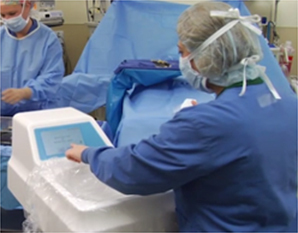
For the past two years, the Joint Commission has cited "unintended retention of a foreign body" as the most frequently reported unanticipated event that leads to serious patient injury or death after surgery. In other words, something like a surgical sponge gets left inside and, if not removed, the patient may die from the resulting infection. This doesn't happen often - about once in every 1,500 open abdominal or chest surgeries - but it shouldn't happen at all.
Our client had already developed a solution to detect surgical sponges using RFID tags and had worked with us to design a surgical wand to read the RFID tags. As a step forward, our client wanted a system that would automatically track the surgical sponges used by a surgical team with as little impact on OR (operating room) protocols and workflows as possible. Informed by previous research, including OR observations, our team had an understanding of the needs of the OR personnel who count the surgical sponges, including the timetable and responsibilities of each. In a knowledge-driven innovation session with representatives from our client, we identified the critical functional areas and interaction points that had to be supported by the system and carefully considered the applicable human factors standards. Our industrial design team collaborated with our client’s engineers to design, develop, and build a basin system to support a centralized, easy, hands-free scan-in procedure for new sponge packs to activate the RFID tags, as well as a large-volume, centralized, effortless scan-out process to reconcile used surgical sponges. The end result was a usable and useful RFID surgical basin.